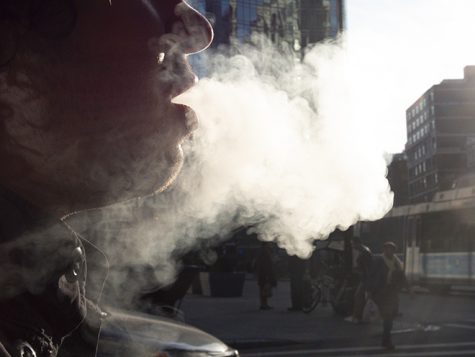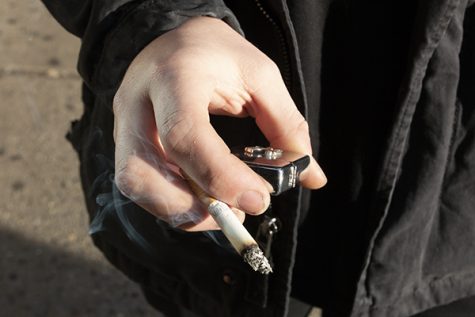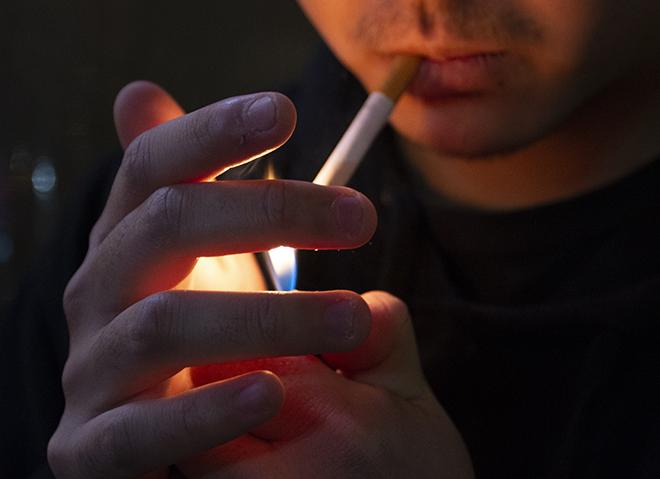Students casually puffing on cigarettes five feet in front of Bobst Library’s no-smoking sign can be a perplexing sight to outsiders. For NYU students, it’s routine.
“It’s inevitable that students smoke on campus despite signs because legally we’re adults,” CAS junior Katherine Chen said. “However, I really hate the smoke outside of Bobst because it’s contained and there’s no way to escape it.”
NYU has a smoke-free campus policy, though you wouldn’t know it from the countless students seen smoking in front of entrances to NYU buildings like Bobst Library and the Silver Center for Arts and Sciences.
The policy, enacted in June 2014, “prohibits smoking at all times on the University campus, including… within close proximity to… any building entrance.” This policy was created in compliance with the New York City Smoke-Free Air Act, intended to ensure the comfort and health of students and the city’s residents.
TV commercials, public service announcements and large, gory images on cigarette packs do their best to inform Americans about the dangers of nicotine products. Chen has apprehensions about smoking fueled by vivid images of black lungs as well as worries about wrinkles and yellowed teeth. Having lived and studied in the United States, Europe, Asia and the Middle East, she also realizes the varying perceptions of smoking among different countries.
“Generally, the U.S. is more stringent on health education, especially of smoking,” Chen said. “I do think that people view it more negatively here, while it is much more normalized and not taboo in other countries.”

While some would agree that smoking is looked down upon in the city, CAS sophomore Dae Oh Kim states that the U.S. is more lenient compared to his home country of Korea. According to Kim, there are heavily enforced laws and social punishment in Korea that effectively prohibit smoking within 20 feet of any bus stop.
“If you’re smoking on big streets [in Korea], the cops will find you,” Kim said. “If there are people around, they’ll give you the stare or give you the talk. There are smoking zones and internet cafes, and in really big parking lots there’s a corner you can go to, but that’s about it. Everywhere else is a no-smoking zone.”
Since coming to NYU, Kim picked up vaping to get his nicotine fix, saying that he only started smoking in college but admits he is now addicted.
“Everyone was vaping, so I tried it out,” Kim said. “It’s an addiction, so I just smoke and it’s really hard to stop.”
He added that he’s among the many who have chosen the entrance of Bobst as their go-to smoke spot, not concerned about NYU’s no-smoking policy.
“It’s a joke,” Kim said. “It’s not really enforced. They’re not going to curb [students’ smoking habits], no way.”
Many students feel that NYU’s no-smoking policy isn’t effective. As a non-smoker, Steinhardt graduate student Yuki Abe appreciates how her hometown in Japan has many designated smoking areas to control the prevalence and smell in public, and she wishes there was something similar at NYU.

“Smoking also affects non-smokers,” Abe said. “In Japan, there are still some restaurants, cafes or bars where people can smoke. It’s not a big deal for Japanese students, but there are people who don’t like smoking, like me. I don’t like people smoking on campus or on the street.”
While NYU hopes to dissuade students through official no-smoking rules, some think the solution lies in accommodation rather than suppression.
Students smokers find many defenses for validating their addiction.
GSAS student Channy Jordan-Grier, who is from North Carolina, says that smoking is common among college students, especially in states where the age limit on purchasing nicotine products is only 18, as it is in most of New York state.
Like Kim, Jordan-Grier started smoking in college and picked it up as a regular habit as the years went by and stress piled on.
“It was very occasional, like once a month,” Jordan-Grier said. “Senior year, I smoked almost every day because I had two jobs, I was going to school and I had to graduate.”
A smoking habit picked up in college can often persist even after graduation.
“Me and my friends would go hang out and de-stress together,” Jordan-Grier said. “It still serves that purpose now.”
Beyond stress relief and socialization, smoking can keep people warm and satiated during the winter season.
“A pack of cigarettes can run you as little as two dollars where I’m from,” Jordan-Grier said. “That’s 20 cigarettes for 10 cents a cigarette. Instead of buying food that you can’t afford, you would have your appetite suppressed for at least a few days before you can earn any more money. It also took my mind off the blistering cold.”
There is, however, an abundance of research proving that the devastating harm caused by cigarettes far outweighs any of these benefits.
Whether for or against smoking, students can agree that the answer lies in separation and compromise instead of trying to force students to give up their ingrained guilty pleasures.
“At the end of the day, it’s an addiction and that’s people’s way to cope with things,” Jordan-Grier said. “They shouldn’t be punished for how they’re coping.”
Luckily for NYU’s smoking community, they have a whole city of public streets on which they can take a smoke break.
A version of this article appears in the Monday, Feb. 10, 2019, print edition. Email Kylie Marsh at [email protected].

























































































































































